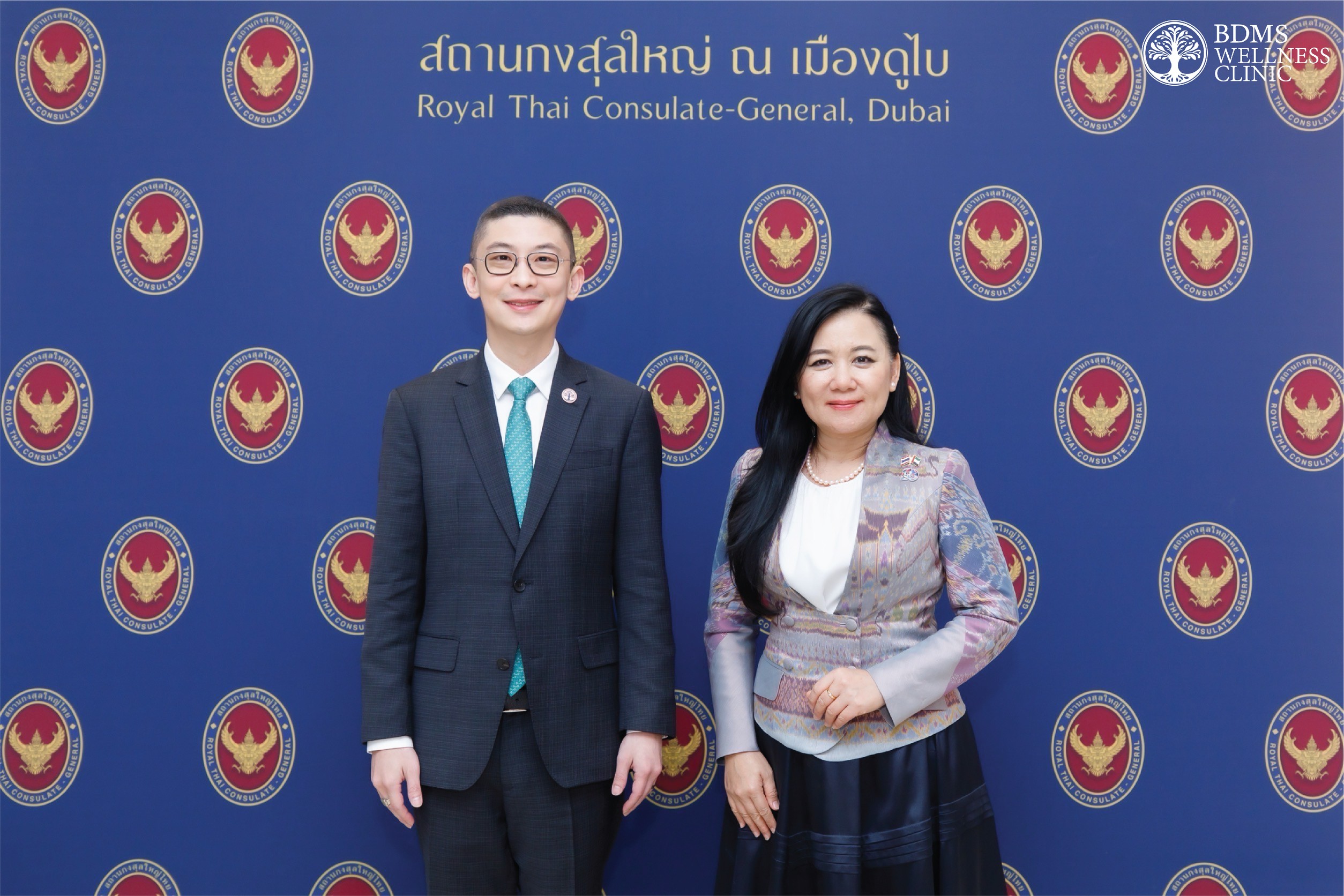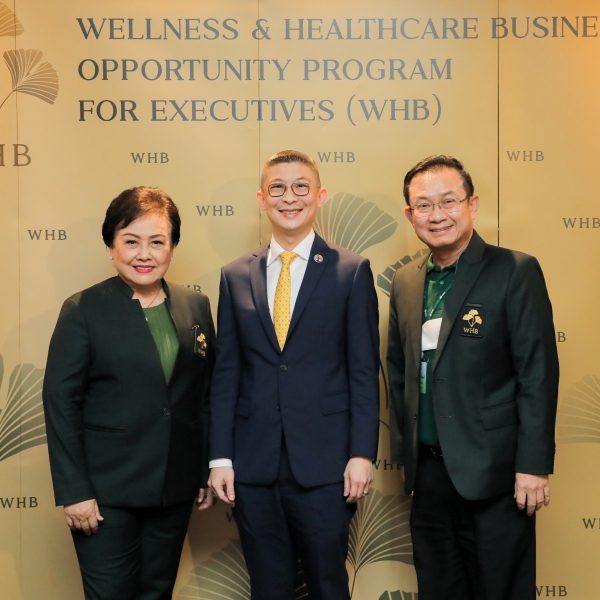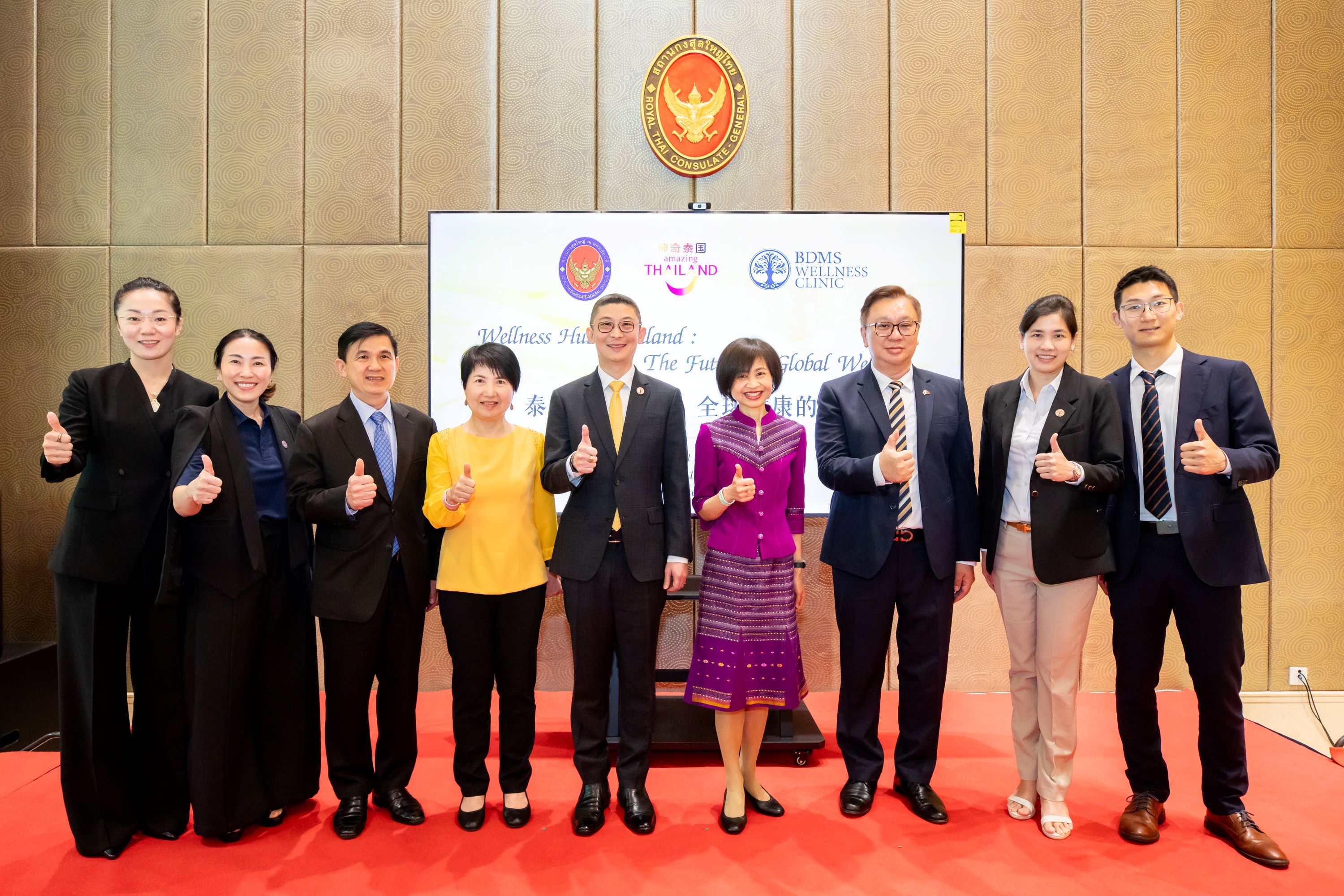Wellness Hub Thailand Takes the Stage in Dubai: BDMS Wellness Clinic Led by Dr. Amp Shares Strategic Insights on Wellness and International Collaboration at the Royal Thai Consulate-General in Dubai, UAE

Advancing Global Health Collaboration: Thailand-Dubai Wellness Initiative! Tanupol Virunhagarun, also known as Dr. Amp, Chief Executive Officer of BDMS Wellness Clinic and BDMS Wellness Resort, Bangkok Dusit Medical Services Public Company Limited (BDMS), was honored by the Royal Thai Consulate-General in Dubai, United Arab Emirates, to represent Thailand in sharing expertise on preventive healthcare. The Health Talk, titled “Wellness Hub Thailand: The Future of Global Wellness,” emphasized the creation of global health standards, aligning with the Dubai Health Strategy 2026, which aims to elevate healthcare standards and promote preventive care within the United Arab Emirates. This initiative also highlights Thailand’s role as a global destination for wellness and preventive healthcare. Dr. Amp’s presentation further strengthened the connection between Thailand and the UAE, advancing the shared goal of enhancing global health and wellness. The event was graciously hosted by Ms. Nipa Nirannoot Consul-General of Thailand to Dubai and the Northern Emirates, and was attended by distinguished guests from various sectors in the United Arab Emirates, reflecting the strong collaboration between the two countries in promoting global health and wellness.
Not Just Wealth, But Health: The Connection Between Dubai Health Strategy 2026 and Dr. Amp’s Vision to Establish Thailand as a Wellness Hub
The United Arab Emirates, particularly Dubai, is widely recognized as a nation of immense wealth and economic strength. However, in addition to its robust economy, Dubai places a strong emphasis on the holistic health of its population. This commitment is clearly reflected in its long-term health vision through the Dubai Health Strategy 2026. The strategy is built upon four key pillars: promoting public health and lifestyle, enhancing the quality and standards of healthcare services, integrating innovation and smart technology into healthcare, and ensuring efficient and sustainable management practices. This strategic approach aligns with the vision of Dr. Tanupol Virunhagarun, or Dr. Amp, in his unwavering commitment to positioning Thailand as a global “Wellness Hub.” Dr. Amp’s vision focuses on providing world-class healthcare services, integrating medical innovations with holistic health practices, to meet the evolving health needs of the global population. By aligning with these global trends and strategies, Dr. Amp aims to enhance Thailand’s standing as a premier destination for wellness, offering holistic healthcare services that combine modern medicine with preventive and holistic care.
With a shared vision for advancing health and wellness, Dr. Tanupol Virunhagarun was honored by the Royal Thai Consulate-General in Dubai, United Arab Emirates, to speak at a health seminar under the theme “Wellness Hub Thailand: The Future of Global Wellness.” The seminar aimed to facilitate the exchange of knowledge and visionary perspectives on preventive healthcare within a global context. Dr. Amp shared his expertise and strategic insights on positioning Thailand as Wellness Hub Thailand, an international center for preventive and holistic healthcare. This initiative represents a key national strategy to drive sustainable economic development in parallel with improving the quality of life for populations at the international level. The event was graciously opened by Ms. Nipa Nirannoot Consul-General of Thailand to Dubai and the Northern Emirates, who welcomed participants and underscored the importance of global collaboration in building a healthier future.
Is Longevity Truly the Definition of Good Health? Addressing the 10-Year Gap Between Lifespan and Health Span in the United Arab Emirates
While extended life expectancy is often regarded as a benchmark of healthcare advancement, emerging data reveals that longevity alone does not guarantee true well-being. This issue is becoming increasingly relevant in the United Arab Emirates (UAE), where a notable gap of up to 10 years exists between average lifespan and the number of years individuals live in good health. Advancements in modern medicine, ranging from precision treatment and improved healthcare access to the integration of cutting-edge medical technologies, have significantly contributed to increased global life expectancy. According to the World Health Organization (WHO), the global average lifespan rose from 66.8 years in 2000 to 73.4 years in 2019, an increase of 6.6 years. This reflects considerable progress in global disease prevention and treatment efforts. However, these gains do not necessarily translate into a higher quality of life during those extended years. The WHO reports that the average health span, defined as the period during which a person can live independently and without chronic illness, remains at just 63.7 years. This stark contrast between lifespan and health span underscores a critical challenge facing healthcare systems worldwide.
The population of the United Arab Emirates is currently facing a significant health challenge, as recent studies reveal a considerable disparity between average lifespan and healthy life expectancy. While the average lifespan in the UAE stands at a commendable 76.1 years, reflecting advances in medical care and healthcare access, the data also points to a growing concern. According to recent research, the health span, defined as the period during which individuals live in good health without chronic illness or functional decline, averages only 66 years. This 10-year gap suggests that a significant portion of the population is likely to spend the final decade of life living with chronic diseases or age-related deterioration of bodily functions.
“This situation has emerged as one of the key structural challenges directly impacting the quality of life across the region. It is increasingly prompting various sectors to recognize the critical importance of preventive healthcare, rather than focusing solely on reactive healthcare, which addresses health only after illness or complications have occurred,” said Dr. Tanupol.
“A forward-looking approach such as Scientific Wellness provides a meaningful solution. It emphasizes holistic health management grounded in scientific data and advanced health technologies. Our goal today is not merely to help people ‘live longer,’ but to ensure they ‘live longer in good health and with quality of life,’” he added.
Research Reveals: Over 77% of the UAE Population Affected by NCDs, with More Than 6.9 Million Facing Overweight and Obesity
As the global population moves steadily into the era of an aging society, public health challenges are becoming increasingly complex and severe. One of the most pressing issues is the rise of non-communicable diseases (NCDs), which have now become the leading cause of illness and death worldwide in the 21st century. According to the World Health Organization (WHO), more than 45 million people died from NCDs globally in 2022, highlighting the urgent need to shift from a reactive healthcare approach to a preventive healthcare model.
In the United Arab Emirates, NCDs represent a pressing and immediate public health concern. Statistics indicate that over 77% of all deaths in the country are attributed to non-communicable diseases, amounting to approximately 16,100 deaths per year, or an average of two deaths per hour. The primary causes include cardiovascular diseases, cancer, chronic respiratory diseases, and diabetes, as reported in 2022. In addition, data from the WHO shows that 6,966,723 individuals – out of a total population of 9,771,000 in the UAE – equivalent to 71.3% of the population, are affected by overweight or obesity. This condition poses a significant risk to long-term health and increases the likelihood of developing chronic illnesses. The global COVID-19 pandemic further highlighted the health vulnerabilities associated with pre-existing conditions. Research revealed that individuals with high blood pressure were at twice the risk of severe illness, those with heart disease or diabetes faced a threefold increase in risk, individuals with a history of stroke had four times the risk, and those with obesity were found to be at seven times higher risk of death compared to the general population.
Dr. Amp Leads Thailand’s Push for Wellness Hub Thailand: Merging Soft Power, Innovation, and Thai Heritage to Elevate the Nation as a Global Wellness Destination
The recent visit of Dr. Tanupol Virunhagarun, or Dr. Amp, to the Royal Thai Consulate-General in Dubai, United Arab Emirates, represents a pivotal step in enhancing Thailand’s image on the global stage. This engagement served as a platform to share his forward-looking vision for innovative health and wellness, while also opening new opportunities to showcase Thailand’s growing potential as a premier international wellness hub. Dr. Amp reaffirmed his confidence in Thailand’s diverse strengths – from its natural beauty and abundant resources to its cultural heritage – all of which position the country uniquely for global leadership in wellness tourism. Thailand’s landscape, rich with stunning coastlines, lush mountains, and nature-based retreats, provides an ideal environment for relaxation, recovery, and holistic health. In addition, Thai cuisine, known for its distinctive flavors and nutritional value, plays a vital role in supporting well-being. The country’s internationally recognized expertise in herbal medicine and traditional Thai medicine, particularly Thai massage and Thai spa practices, further strengthens its status in the wellness industry. These practices, rooted in centuries-old wisdom and delivered with internationally standardized service, have become one of Thailand’s most powerful soft power assets in global health and wellness. This unique combination of traditional knowledge, natural healing environments, and cultural richness continues to attract health-conscious travelers from around the world, particularly those seeking physical, mental, and holistic rejuvenation.
Furthermore, Thailand’s continued progress in advanced medical technologies, coupled with the presence of highly trained and specialized healthcare professionals, serves as a key driver in elevating the country's capacity to provide healthcare services at an international standard.
"With these advantages, Thailand is fully equipped to emerge as a Global Wellness Hub, serving not only as a leading destination for wellness tourism that delivers exceptional, transformative experiences to visitors, but also as a symbol of leadership in preventive healthcare, the promotion of sustainable well-being, and the global movement toward long-term health equity," Dr. Tanupol concluded.



